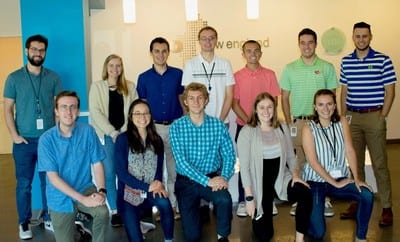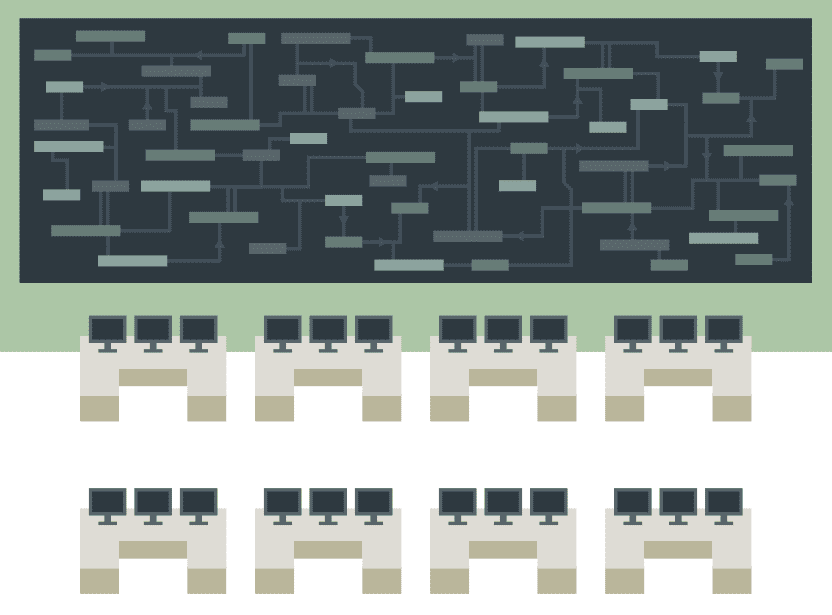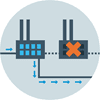“Keeping the lights on”: Summer interns meet system operators, tour backup control room
 “What is ISO New England?” When you’re short on time, the go-to answer is five words. “We keep the lights on.” Brief and accurate, it’s the easiest way to describe what we do at the ISO. But the control room, where ISO system operators man the front lines of that responsibility, is a mysterious place.
“What is ISO New England?” When you’re short on time, the go-to answer is five words. “We keep the lights on.” Brief and accurate, it’s the easiest way to describe what we do at the ISO. But the control room, where ISO system operators man the front lines of that responsibility, is a mysterious place.
 First group of 2019 interns to tour the Backup Control Center. Back row L-R: Brandon Whitburn, Allison Ryan, Cody Richter, David Koleczek, Albert Duncan, Alex Glanville, Kyle Moynihan. Front row L-R: Jackson Morgan, Annalyse Nichols, Dylan Manchester, Micaela Bartlett, Victoria Soucy.Then on June 26, the summer interns got a glimpse inside the Backup Control Center and what it really means to keep power flowing to 15 million New Englanders.
First group of 2019 interns to tour the Backup Control Center. Back row L-R: Brandon Whitburn, Allison Ryan, Cody Richter, David Koleczek, Albert Duncan, Alex Glanville, Kyle Moynihan. Front row L-R: Jackson Morgan, Annalyse Nichols, Dylan Manchester, Micaela Bartlett, Victoria Soucy.Then on June 26, the summer interns got a glimpse inside the Backup Control Center and what it really means to keep power flowing to 15 million New Englanders.
The students, many of whom weren’t sure of the ISO’s role before the start of their internship, traveled to Windsor, Conn. for a tour and an overview of a day-in-the-life of a system operator.
Upon arrival, Shift Supervisor Jeff Belanger escorted the students into the control room where desk chairs were aligned just a few feet from the massive control screen. To most interns, it was unlike anything they had ever seen.
“It was slightly overwhelming,” said Cody Richter, an intern in Cybersecurity. “Big screens, flashing colors, monitors lining each end of the display, not to mention an enormous map with tons of symbols. It was a lot to take in.”
Belanger highlighted the importance of the map’s literal bells and whistles, and described how the region’s substations, generators, and transmission lines are presented on the display.
The interns were then given a crash course in the control room operation. Every second of every day, system operators ensure that the transmission grid meets the demand for electricity region-wide, all while staying composed during system malfunctions and failures.
“Our mandate is to keep the system reliable for all customers,” Belanger said. “If there is a high stress day, you’ll never know about it.”
From there, the students broke off into small groups to visit the desks on the control room floor—generation, load, security—to learn the specific role each operator plays (other desks are for the forecaster; Tariffs, Schedules, and OASIS (TSO) Administrator; Senior System Operator; Shift Supervisor; and a spare station staffed in emergencies and used for training).

 Generation
Generation
The generation desk, generation, is responsible for keeping tabs on the generation schedule across the region. The system operator periodically places phone calls to generation plants, becoming the de facto “communication liaison” for the control room floor. Work spread across six computer screens, the operator tracks the real-time wholesale prices while monitoring the import and export of electricity across interchanges with other control areas including those operated by ISOs and RTOs.
A growing challenge to the generation desk is the introduction of renewables into the system. David Koleczek, a second-year intern in Information Services, said he found this information to be the most fascinating part of the morning.
“My team actually works on a lot of the software that they use in the control room,” he said. “[The operator] explained how solar and wind resources bid differently into the market. It was really cool to see things I’m a part of put into action.”
 Load
Load
In the middle of the control screen, a red bar graph fluctuates steadily depicting the most important topic on the floor—are we generating enough electricity to match the demand across New England? The system operator behind the load desk asks this question every second of the day.
The red bar graph, known as the Area Control Error (ACE), shows how effective the predicted load is matching up in real-time. This goal is to compensate for any discrepancies in the relationship due to under- or over-generating of electricity. System Planning Intern Allison Ryan was especially interested in the load, or consumer demand, because of its relation to her everyday work.
“So much happens to the load every day—especially now with so many renewable resources in New England– and with the uncertainties surrounding cloud cover and wind, the load can fluctuate very quickly,” she said. “Having to keep total focus all day is really difficult, so it’s even more impressive when they have the weather to account for.”
 Security
Security
The security desk—a favorite among the interns—examines the “what if” scenarios on the grid. This operator makes plans following the simulations of contingencies that throw a wrench into the smooth operation of the system. Not only are simple malfunctions such as wire failure accounted for, but the system operator at the security desk always stays one step ahead in the process.
Richter said he was amazed at the complexity of the role. “I thought it was stunning how they were running scenarios all day,” he said. “They aren’t just reacting directly to one scenario, but also to a “what if” something went wrong with the first contingency they were working with. It’s cool how they’re reacting to multiple hypotheticals that could happen one after another.”
Thanks to the security system operator, the entire control room floor is ready for any unforeseen event that threatens a blackout. As a team, the operators at ISO New England have made “turning the lights on” an afterthought.
“When you put it into perspective, how reliable the grid has become is crazy,” said Micaela Bartlett, an Internal Audit intern. “Like [Belanger] said, if there’s a high stress event, the average person who uses electricity really wouldn’t know about it. They run software and are able to use it to stop a crisis before it even happens.”
“I’ve been to developing countries like Kenya and India, and the power there is intermittent,” said Richter. “Mid-afternoon, the lights just go off, and people are accustomed to it. The way it’s managed in New England, we don’t even begin to think about a situation like that. They [control room operators] do such a good job that when we go home, we know the lights will turn on.”
- Categories
- Inside ISO New England
- Tags
- system operations
